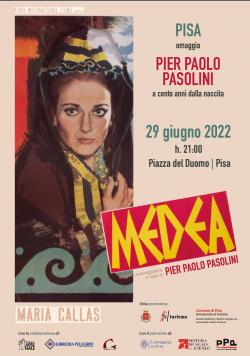
On the occasion of the centenary celebrations for the birth of Pier Paolo Pasolini, Pisa paid homage to one of the greatest intellectuals of the 20th century with a series of cultural initiatives, including screenings of his entire filmography, meetings and book presentations, as well as an exhibition event entitled 'Something is always missing...' with videos, photographs and graphic works at the Museo della Grafica in Palazzo Lanfranchi. The celebratory events culminate on Wednesday 29 June with the screening of the film 'Medea' at 9 p.m. in Piazza dei Miracoli there will be a screening of Pier Paolo Pasolini's film, in Italian with English subtitles. Anthropologist and philologist Maurizio Bettini will speak at the opening of the evening. The event will be open and free of charge, with access to the lawn in front of the stretch of wall adjacent to the entrance to Piazza Manin (behind the Baptistery), where spectators will be able to freely sit on the lawn.
Presenting the event this morning at a press conference at Palazzo Gambacorti were Paolo Pesciatini, tourism councillor for the Municipality of Pisa, and Antonio Capellupo of the Arsenal Cinema. Promoter of all the events with which Pisa pays homage to Pier Paolo Pasolini is the Municipality of Pisa, in collaboration with the University of Pisa, the Arsenal Cinema and with the organisational direction of the Pellegrini bookshop.
Medea, in Greek mythology, lived in the Colchis, a region in the far east of the world, seen as the destination of the Argonauts. But from here she fled, after stealing the Golden Fleece, to marry Jason (the athlete Giuseppe Gentile, bronze medallist in Mexico City 1968 in the triple jump) and went to live in Corinth. For his reconstruction of Corinth, Pier Paolo Pasolini relied on Pisa for the interior (Unesco World Heritage Site since 1987) and Aleppo for the exterior (since 1986). The choice was made with great care. The two cities are similar in something (the Romanesque style in Pisa is partly inspired by Arab culture) and in Pasolini's imagination the interior of the city of Pisa, represents rationality, and the exterior (the walls of Aleppo), with its upward-pointing architectural lines, sacredness: a contrast that would lead to the final tragedy.
The journalist Marco Barabotti, who passed away in 2015, wrote: 'Following film history lessons at university as a student, Professor Raffaele Monti made me participate in the 1969 filming of 'Medea'. In the film, Pasolini, in order to represent the two worlds, the sacred and the rational, namely the world of Medea and Jason, juxtaposed, or rather juxtaposed in the scene, two architectures: the citadel of Aleppo and the Piazza dei Miracoli."